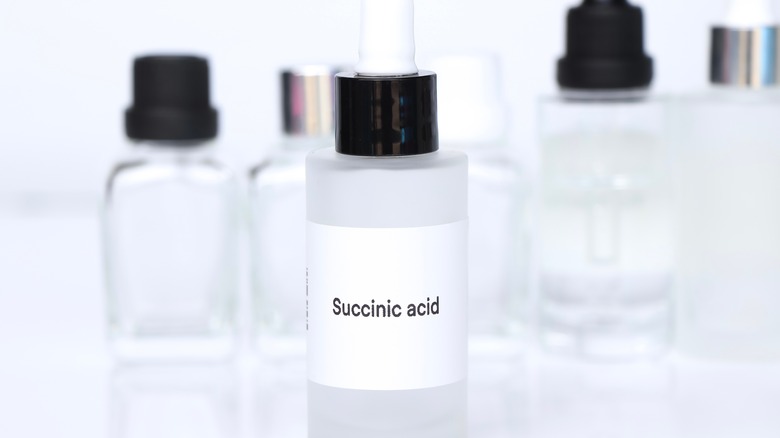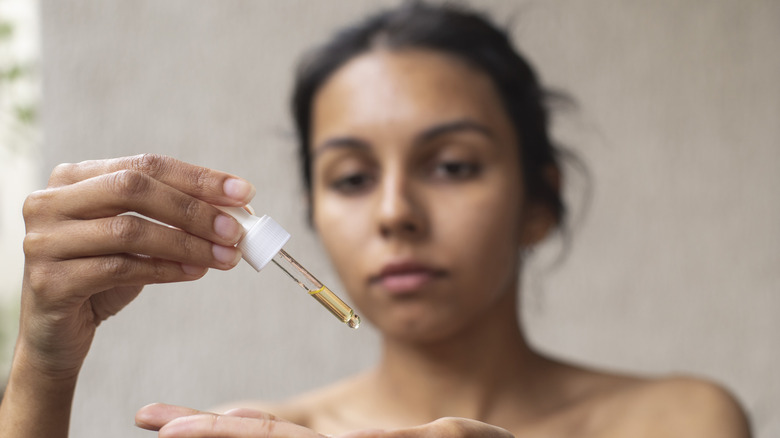New Active Alert: Succinic Acid Is Here To Fight Your Acne
It seems like every day there's a new skincare favorite on the block that everyone's raving about — and today that product is none other than succinic acid. "Succinic acid is the unicorn acid, because it really does work skin-transforming magic." That's how Inge Theron, founder of British skin-care brand FaceGym, described the product (which you may also know as also known as butanedioic acid) while speaking to Fashionista. So with a glowing review like that, how could we not take a deep dive into exactly what this new do it all product actually is? If you've never heard of it before or just want more info, then allow us to explain.
Despite being an acid, which can have connotations of being super harsh and stripping the skin, succinic acid actually holds anti-inflammatory, antibacterial, and antioxidant benefits. It's a natural ingredient that can be found in the likes of amber and sugar cane. While the human body can naturally produce it too, it has now been created artificially. That's probably why you've been hearing about it so much lately because the scientific breakthrough has made the product much cheaper and easier to get our hands on. But what does it do? Who can use it? And does it have side effects? These are the big questions we're answering.
What succinic acid actually does
As we mentioned, you shouldn't expect anything too harsh when trying out succinic acid. Unlike a lot of acid products, it actually soothes the skin, works against inflammation, and kills bacteria at the same time. It can also be applied not only to treat current breakouts but also to prevent further ones from forming. That's because succinic acid helps prevent Propionibacterium acnes, which is known to cause breakouts. "[It] helps control sebum (oil) production and bacteria levels in the skin, making it useful for those who suffer from breakouts," aesthetic doctor and skin expert, Dr. Sophie Shotter told Women's Health. After using a product containing succinic acid (it's more common to find it as an ingredient in other products rather than on its own), you should expect your skin to feel less oily as it rebalances the skin's pH and makes it less prone to recurring breakouts.
But that's not all it's known to help. The acid can also boost the skin's hydration, reduce the appearance of blackheads and fine lines, and thanks to the fact that it's an antioxidant, it can reverse skin damage from the likes of pollution or UV rays. "Succinic acid helps to boost your cellular renewal, which means it's helping to boost how well your skin cells are functioning," Dr. Shotter noted.
What skin types react well with succinic acid?
Succinic acid is one of those great ingredients that can be used by almost anyone — even those with sensitive skin. Because one of its main uses is to help with blemishes, those with oily skin and acne issues may see the most benefits, though, as it helps to balance the oils on your face. But anyone who struggles to find something that doesn't irritate their skin but wants to target fine lines are also great candidates to try out the acid's impressive benefits.
One of the best things about succinic acid is that, in some cases, its effects can be seen immediately. That makes it ideal for those with skin conditions like blemishes who are hoping for fast results. "I recommend succinic acid to everyone if you want a standout glow before a big event. We're all looking for those satisfying instant results, which succinic acid absolutely delivers on," FaceGym's Inge Theron told Fashionista.
Just remember to be careful
Though succinic acid is somewhat of a miracle product, you still want to be careful. As with any product you apply to your skin, it's vital you do your research before adding it to your routine as everyone's skin is different, which means different people can have different reactions. We'd always recommend doing a patch test before applying something new all over your face, especially if it's going to be placed over blemishes or acne, which can easily become irritated or infected.
One of the best ways to avoid any potential side effects too is to gently layer it with other products. Amongst some of the other skincare products you can apply it alongside? Hyaluronic acid, salicylic acid, and retinoids (which includes retinol, of course), board-certified dermatologist, Dr. Ava Shamban told Fashionista. But, as NHS junior doctor Dr. Kemi Fabusiwa explained to Women's Health, you should always layer your skincare combos, never mix them: "It is still advisable not to combine it alongside other strong actives in the same routine but rather to use it alongside ingredients like hyaluronic acid to hydrate the skin's barrier." Those with sensitive skin or skin conditions may also want to be a little more careful about how quickly they introduce succinic acid into their routine to keep the chances of irritation or reactions to a minimum.



